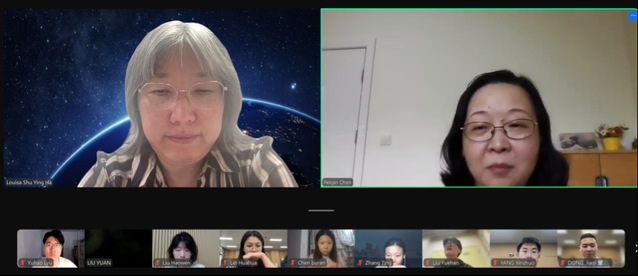
By Guo Yishun,Lyu Yuhao,Li Lun
On October 14, 2024, Professor Louisa Ha, a distinguished research excellence professor at Bowling Green State University, Ohio, and founding editor of Online Media and Global Communication, led an online seminar titled “Research and Academic Publishing Ethics.” Hosted by Professor Chen Peiqin of SISU’s School of Journalism and Communication, the seminar provided critical insights into the ethical considerations students must navigate in academic research and publishing.
Professor Ha opened the session by discussing the importance of ethical practices throughout the research process, from design to publication. She stressed the need for transparency, objectivity, and participant privacy, highlighting the ethical responsibilities researchers have in ensuring their work maintains integrity. These include avoiding conflicts of interest, properly handling data, and adhering to ethical reporting standards.
A key focus of the seminar was the ethical challenges that arise during peer review and the publishing process. Professor Ha outlined the moral obligations of authors, reviewers, and editors, explaining that each party plays a role in upholding the credibility of academic publishing. She cautioned authors against unethical practices such as plagiarism, self-plagiarism, and multiple submissions. Reviewers, she noted, must be vigilant about avoiding bias, ensuring confidentiality, and providing fair assessments, while editors should avoid conflicts of interest and undue influence.
Professor Ha also introduced the Committee on Publication Ethics (COPE) and its 2017 Core Practices, a globally recognized framework that provides guidelines on issues like authorship, peer review, and misconduct penalties. The COPE guidelines serve as a crucial resource for anyone involved in academic publishing, ensuring that ethical standards are met across the process.
Concluding the seminar, Professor Ha shared practical advice on becoming a reliable peer reviewer, emphasizing the importance of subject expertise, fairness, and strong communication skills. During the Q&A session, she addressed questions from the audience about managing reviewer bias and safeguarding participant consent, especially in social media research.
Professor Chen Peiqin, who hosted the event, noted that the seminar provided valuable insights into the ethical standards essential for academic research and publishing, giving students practical tools for navigating the complex landscape of academic integrity.


 |Hongkou Campus|550 Dalian Road (W), Shanghai 200083, China |Songjiang Campus|1550 Wenxiang Road, Shanghai 201620, China
|Hongkou Campus|550 Dalian Road (W), Shanghai 200083, China |Songjiang Campus|1550 Wenxiang Road, Shanghai 201620, China